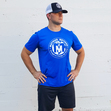Nutrition Basics for New Gym Members
Stepping into the world of fitness, nutrition and weight loss can feel like embarking on a grand adventure—full of excitement, anticipation, and perhaps apprehension. However, being a new gym member can be a tough place to find yourself if you don’t know exactly what you’re doing. It can be a challenge, even if you do!
Until January, gym membership in the US had risen, but that has ground to a halt somewhat. There could be many factors for this drop, including confusion about what is and is not good for you. There’s so much information, supplements, nutrition, and eating guides; it’s hard to see the woods through the trees. The amount of weight loss and gym information is quite scary and that could put you off from becoming a gym regular. Or maybe you are a gym regular and find it all a little confusing.
As you lace up your sneakers and prepare to lose weight and get in shape, we’re going to help break down some of the information you need about nutrition. After all, what you eat plays a pivotal role in shaping your physique, fueling your workouts, and maximizing your gains. Pushing weights and pumping iron is only one side of the equation, and with the right information, you can leverage nutrition to see those significant gains.
So, grab a protein shake and join us as we dive into the fundamentals of nutrition for new gym members.
ProteinWhen it comes to nutrition, it’s important to understand that protein reigns supreme. Known as the building blocks of muscle, protein is essential for repairing and rebuilding the tissues broken down during an intense gym session. But how much protein do you actually need?
The general recommendation for protein intake ranges from 0.8 to 1 gram per pound of body weight per day. However, this can vary depending on several factors: age, gender, gym activity level, and even your end fitness goals. Aiming for the higher end of this protein range may be beneficial for those looking to pack on extra muscle.
Those looking to take on protein should ensure their diet is rich in foods such as chicken, turkey, and fish, which are excellent for gym goers as they provide high-quality protein with minimal fat. Plant-based sources such as tofu, tempeh, lentils, and beans are also optional choices for those following a vegan diet.
CarbohydratesCarbohydrates often get a bad rap in the fitness world, but to dispel the myth, they’re a vital source of energy. This is especially the case when it comes to high-intensity exercise. Complex carbohydrates, such as whole grains, fruits, vegetables, and legumes, provide a steady supply of energy to fuel your workouts and support recovery.
It can be hugely beneficial to time your carb intake with your planned workout. Consuming a meal (or even just a snack) containing carbohydrates and a small amount of protein immediately before your workout can help fuel your training session and improve performance. Also, taking onboard carbohydrates and protein after your workout can help replenish glycogen stores and give the muscle repair process a head start.
FatsLike Carbs, fats have a bad reputation with nutritionists, but they are also essential as part of your gym regime. Fats are an essential nutrient that plays a crucial role in overall health and fitness; healthy fats, such as those found in avocados, nuts, seeds, olive oil, and fatty fish, are particularly beneficial for gym goers.
Not only do healthy fats support hormone production and brain function, but they also help keep you feeling full and satisfied, making it easier to stick to your nutrition plan. During any gym regime, motivation for weight loss is a big factor in ongoing success. The gym offers a community of like-minded people to help you along your journey, but healthy fats can help keep you motivated in terms of your nutritional needs as well.
HydrationIt’s such a basic bit of advice that your average gym bro will already know it, but it’s worth repeating; staying hydrated is absolutely essential for gym goers. Even mild dehydration can negatively impact performance and recovery. Aim to drink at least 0.7 ounces of water per pound of bodyweight per day, adjusting based on activity level, climate, and sweat rate. Like healthy fats, drinking water can also help you feel fuller for longer, so you’re less likely to fall off the good nutrition weight loss wagon.
When you’re at the gym, it’s important to stay hydrated by sipping water regularly throughout your session, whatever machine you’re on. If you’re engaging in prolonged or intense exercise, you may also need to replenish electrolytes lost through sweat by consuming a sports drink or electrolyte-rich foods such as bananas or coconut water.
SupplementsWhile whole foods should always form the foundation of your diet, supplements can serve as valuable tools to fill in any nutritional gaps and support your fitness goals. This is really second-level advice for those who have already nailed down their nutrition, lost weight, and now want to sculpt and put on muscle.
Whey protein powder is popular for gym goers looking to increase their protein intake and support muscle recovery. Creatine is another supplement that has been extensively researched and shown to improve strength, power, and muscle mass.
Fish oil supplements are rich in omega-3 fatty acids, and linked to numerous health benefits, including reduced inflammation and improved heart health. And let’s not forget that vitamin D plays a crucial role in bone health, immune function, and muscle strength.



